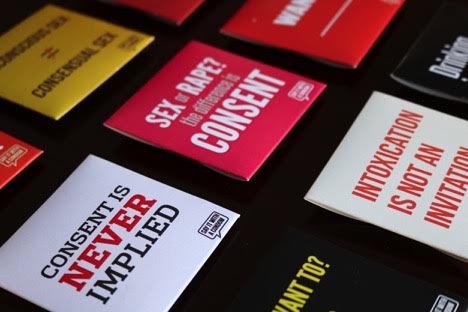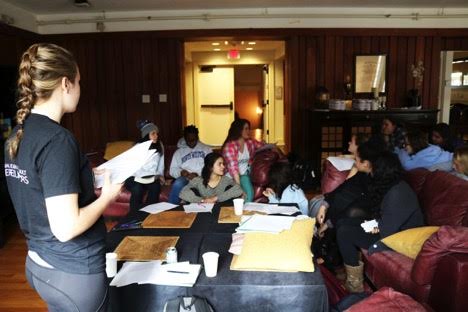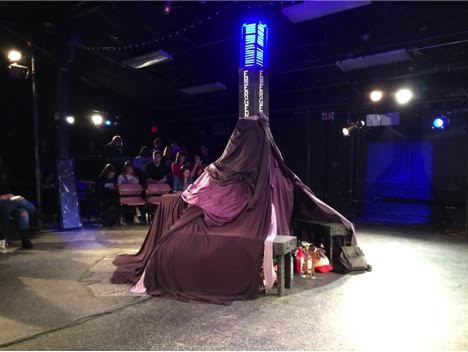
“Make sure that she agrees before you give her the D.”
“Don’t be a schmuck, get a ‘YES!’ before you F#CK.”
“Intoxication is not an invitation.”
These are just some examples of the unique condoms manufactured by Say It With A Condom, a New York-based company churning out custom-designed condoms. The designs on the wrappers range from sexually-charged political puns (think: “The Ultimate Stimulus Package”) to more meaningful – but still hilarious – slogans, such as the ones above, all meant to raise awareness and facilitate dialogue about sexual consent.
Intrigued by the idea of breaking down the “taboos” surrounding the topic of sex, sophomore Alaina McCaffrey was drawn to the campaign’s goals and became a campus rep for Say It With A Condom in the fall of 2015, a job that entailed spreading the word about the company’s products on campus and selling them to members of the Northwestern community.
So does this kind of gimmicky, pun and pop culture campaign actually work to spread awareness about consent among college students?
The roots of sexual assault on college campuses run deep. There are certain expectations ingrained in our society that perpetuate “rape culture.”
For instance, why do we tell women not to leave drinks unattended or not to dress “slutty” or not to walk alone at night, instead of just telling men not to rape? Why do universities make it so difficult for victims to report assaults, and why do the majority of rapists go unpunished?
These problems won’t just go away overnight.
But by simply facilitating conversation about sex and consent with its funny, attention-grabbing condoms, Say It With A Condom is taking baby steps toward raising awareness about the problem. Once you’re done laughing at the hilarious design printed on the wrapper, you can go deeper (no pun intended) and start to think further about some of the underlying issues.
Problematic sexual culture on campus
The sexual culture on campus varies from group to group, but many of us have experienced Northwestern’s infamous “hookup culture” first-hand. One night in that familiar drunken haze, you spot a moderately cute individual through your beer goggles, sloppily make out on the dance floor, go back to your dorm, sexile your roommate – and the next day avoid eye contact in the dining hall, pretending like it never happened.
This atmosphere of alcohol-driven, casual sex is prevalent on many college campuses, and can lead to lots of problems.
According to the National Sexual Violence Resource Center, one in five women and one in 16 men are sexually assaulted while in college, and in the majority of these cases, the assailant and the victim knew each other.
And although alcohol doesn’t cause sexual violence, the NSVRC reports a direct relationship between excessive alcohol use (binge drinking, anyone?) and the risk for committing sexual violence, as well as for being sexually assaulted. Even worse, more than 90 percent of sexual assault victims on college campuses don’t report the assault – a statistic exacerbated by rampant victim-blaming and slut-shaming.
According to a 2015 Campus Climate Survey at Northwestern, while 96 percent of respondents that had experienced an incident of sexual violence reported telling friends or peers, only 7 percent formally reported the incident to the university.
The survey also reported students’ knowledge of campus sexual health resources. Less than two-thirds of the respondents agreed that they knew “where [they] could find information about getting help for sexual assault or sexual misconduct at Northwestern.” In addition, only about a third of respondents agreed that they understood “what happens when a student reports a claim of sexual assault or sexual misconduct at Northwestern.”
Despite the many ways through which the university attempts to raise awareness about safe sex, consent and sexual violence, including initiatives driven by student groups such as Sexual Health and Assault Peer Educators (SHAPE) and Men Against Rape and Sexual Assault (MARS), important ideas like these and how to get help still stay buried in the back of many students’ minds.
For example, when was the last time you thought about Northwestern’s definition of consent, researched sexual health resources on campus, had a discussion with your sexual partner about boundaries or even had sex while sober?
Weinberg senior and SHAPE member Jessica Guenzl acknowledged the existence of sexual education resources on campus, including the Center for Awareness, Response and Education, presentations by SHAPE and MARS, and the pop-up table that gives out free condoms and other sexual health merch, known as the G-Spot. However, she’s “just not sure that people seek them out.”

More reminders needed
The importance of sexual education and health can get lost on students if they’re not regularly reminded of it.
“It’s great to have a workshop, a panel, a speaker or an event to raise awareness – but until we are talking about these topics on a day-to-day basis around the dinner table, real change at a cultural level will never occur,” said Weinberg junior Jacob Kerr, the president of MARS.
According to Kerr, the Student Body Essential NU during Wildcat Welcome addressed important and relevant issues about consent in an engaging way, but it wasn’t perfect. During the tumultuous first week of college, freshmen were only just beginning to dip their feet into the sexual culture on Northwestern’s campus. Therefore, they had little, if any, context for the information presented during the performance and discussion sections.
The ENU successfully got students thinking about consent, but how could the University get them to keep thinking about it?
Several students from the video above agreed that Northwestern should continue to give refreshers about sexual education throughout their college careers in order to keep it fresh in their minds.
This is where Say It With A Condom comes in.
According to a 2001 Stanford study, we learn through association: “Learning is a process of drawing connections between what is already known or understood and new information.” Following the logic of the study, if we’re associating the positive and thought-provoking messages on these condoms with sex, we will eventually see changes in our mindsets and therefore our behavior. Therefore, these condoms could possibly help college students learn about consent even better than a one-time ENU or presentation on sexual violence.
But the recent student-written production Blue Lights, a show meant to share stories about sexual violence across college campuses, is proof that one-time events can be powerful as well. The show was raw and informative, raising questions and provoking discussion about issues related to rape, feminism and alcohol and drug use.

“Let’s bring these issues into the light,” wrote School of Communication senior Hayley Himmelman, writer and director of the show.
Guenzl also hopes to keep college kids thinking about consent but in a different way. She’s organizing an initiative that centers mainly around the Greek community and involves talking to IFC and PHA chapters about the positive aspects of sex.
With this initiative, Guenzl aims to “bring back a little bit more sex positivity to a topic that has sometimes been portrayed in a negative light.”
This elusive sex positivity is one reason why McCaffrey was so interested in being a part of Say it with a Condom’s campaign – she thought the company’s use of “humor and clever packaging” was a great way to make conversation about protected sex and consent “a little bit lighter.”
As for Guenzl, her favorite custom condom featured the slogan, “Don’t be silly, cover your willy” (accompanied by a photo of Willie the Wildcat, of course). She praised the condoms' ability to remind people how fun, exciting and positive sex can be.
“The only way to help work toward safer and more sexually respectful culture is to talk about it more, and these condoms will open up dialogue,” Guenzl said.
So the next time you get ready to get down, read the condom wrapper first – and don’t hesitate to talk about consent.